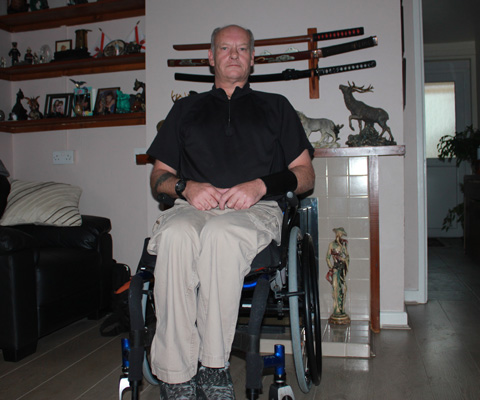Benefit reforms are driving disabled people in Wales further outside the margins of modern society, Rachel Carter reports.
 Disabled people in Wales feel “scapegoated” and “under attack” as a result of changes to the benefits system.
Disabled people in Wales feel “scapegoated” and “under attack” as a result of changes to the benefits system.Image © Tony Hawkins.
When Tony Hawkins became wheelchair dependent three years ago, he didn’t know anyone else in a wheelchair, had no one to contact to ask questions and no family in the area. Tony and his partner Debra were moved into a two-bedroom bungalow in a rural village in Ceredigion, Mid Wales, where they knew no one. As well as the geographical isolation of his situation, Tony is now being hit by a “double whammy” of benefit and local service cuts, which could see him lose his independence altogether.
“A lot of us are housebound by virtue, not by our disability, because these villages and even some of the towns are so far behind a lot of the UK in terms of adaptations and catching up to the idea that people in wheelchairs need wider doors and level access,” says Tony. “We are all very isolated here, there is no real support network and the services that we rely on are being cut as a result of government cuts.”
There are only two shops in Tony’s village that have wheelchair access – a café and the bank – and transport links are a “huge problem” in the area, with the majority of buses not able to accommodate wheelchairs. Tony cannot leave the house unless Debra drives him using their motability vehicle, which is currently funded through his mobility payment. “We have a motability vehicle because we can’t survive without one,” says Tony.
In October this year, the UK Government confirmed its decision to restrict the higher rate mobility payment only to people who cannot walk more than 20 metres. The payment was previously awarded to people who could not walk more than 50 metres and the change will mean that thousands of disabled people will lose support, their motability car and their jobs. “I don’t know whether or not I will lose my vehicle, but it is possible,” says Tony.
“The overwhelming response of consultation was that it should have remained at 50m,” adds Paul Swann, policy officer for Disability Wales. “This change will have a huge impact on disabled people’s ability to live independently.”
Heating or eating this winter?
Tony has also been personally affected by the bedroom tax, the policy which cuts the amount of benefit people can get if they are deemed to have a spare room in their council or housing association home. Unable to downsize due to a lack of one-bedroom properties in the area, he now has to find an additional 15% to pay the rent each month. “We have sold things, we have had to cut back on a lot of things, and then as we start coming into the winter we now have to look at do we put the heating on or do we have a meal,” he says.
According to Cap in Hand, a report published by Disability Wales and the Bevan Foundation in April this year, there is currently no breakdown of the number of disabled people in Wales affected by the bedroom tax but changes to the housing benefit are likely to have a significant impact on disabled people.
“Because of all the shame, the stigma and the stress of being reassessed and in some cases, obviously the entrenched poverty of losing their benefits, disabled people are becoming isolated and they are becoming mentally unwell,” says Eri Mountbatten, a freelance welfare rights trainer, who has seen “an increase in mental health problems” among disabled people as a result of the reforms.
Breaking down the barriers
In April 2012, the Welsh Government published the Framework for Action on Independent Living, which aims to address the barriers to inclusion and equality faced by disabled people in Wales. However there are now concerns that the framework may also be at risk due to the current economic situation. “It seems to me that Westminster is intent on amplifying the disabling role of society with cutting disabled people’s incomes being a critical part of that agenda,” says Paul.
“All the rights that we have gained over 40 years of disability campaigning are being stripped away from us and ultimately we will have to look at being in care because we simply won’t be able to live in society,” adds Tony. “The reforms are alienating us and we are already seeing signs of that.”
“I never saw that I would be sitting in a wheelchair one day unable to technically do anything but that doesn’t get taken into account now,” he continues. “Now I have to justify the fact that this has happened to me and that is a very difficult thing to do.”
